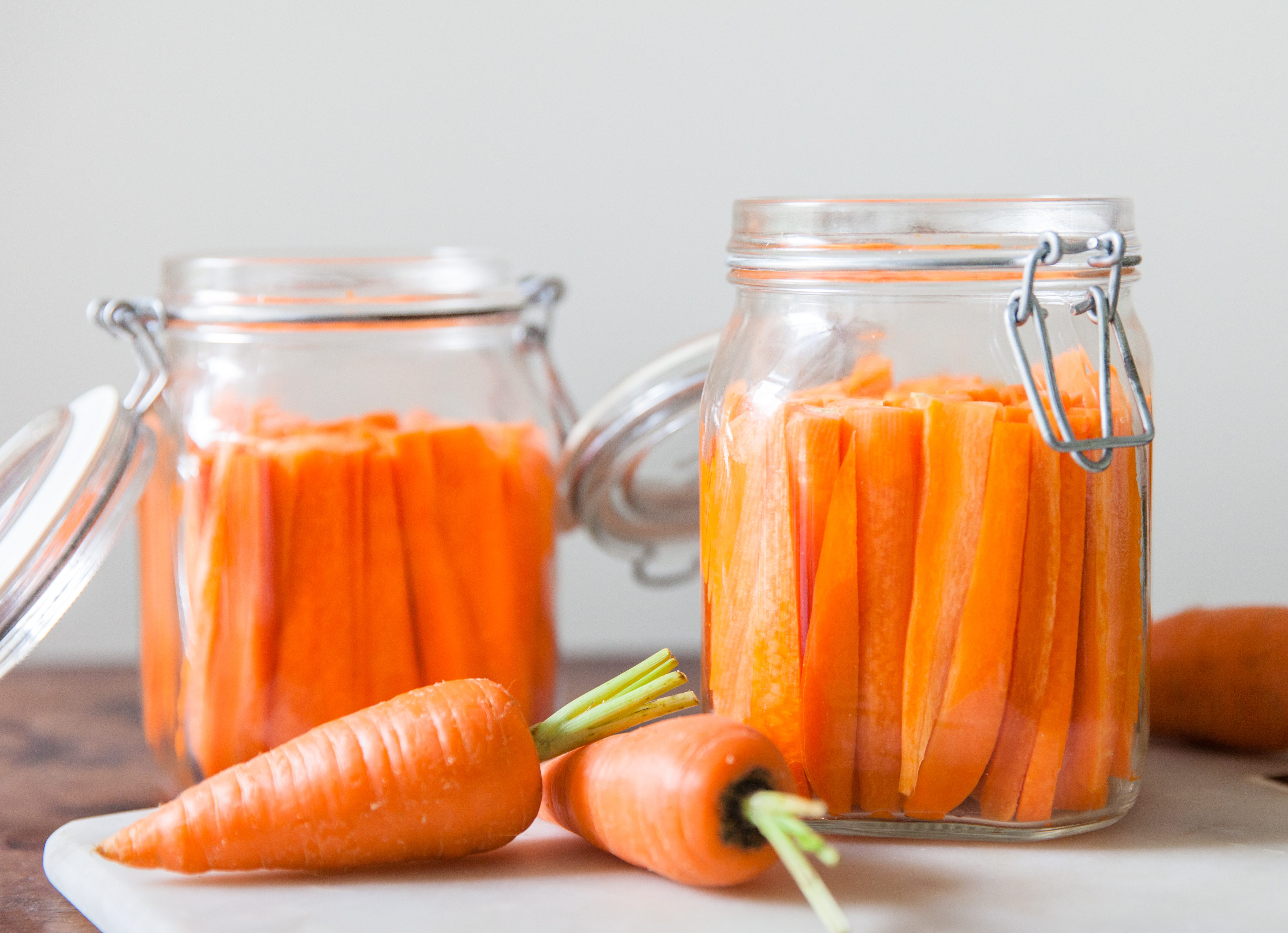
Lacto Fermented Carrot Sticks
Lacto fermented carrot sticks are naturally preserved vegetables that are crunchy and sour like traditionally made pickles. Unlike commercially made pickles that rely on vinegar to create the sour taste and have very little nutrients, these fermented vegetables increase their nutritional value through the fermentation process without using any vinegar and are full of beneficial gut loving microbes (probiotics). The sour taste comes from the lactic acid produced by the bacteria making these are the true original pickles!
So instead of reaching out for the jar of pickles in the supermarket or taking a probiotic pill, have a few of these lacto fermented carrot sticks instead, your gut will love you for it 🙂
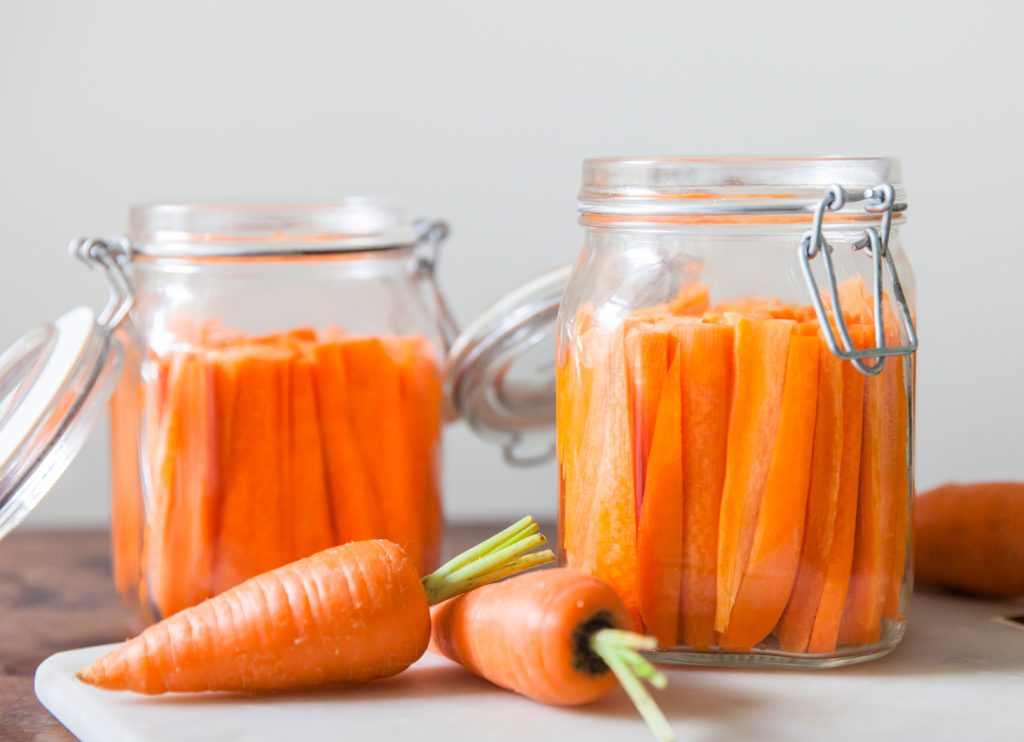
- Fermented foods are full of beneficial bacteria and yeast which help heal and strengthen the gut
- Boosts the immune system (80% of the immune system is found in your gut)
- Keeps you happy, with 90% of the happy hormone serotonin produced in the gut, it can help balance your moods
- Helps maintain healthy weight by eliminating cravings for sugar and refined carbs
- Assists with digestive disorders, IBS, constipation and diarrhoea
- Helps with allergies and eczema by strengthening and healing the gut
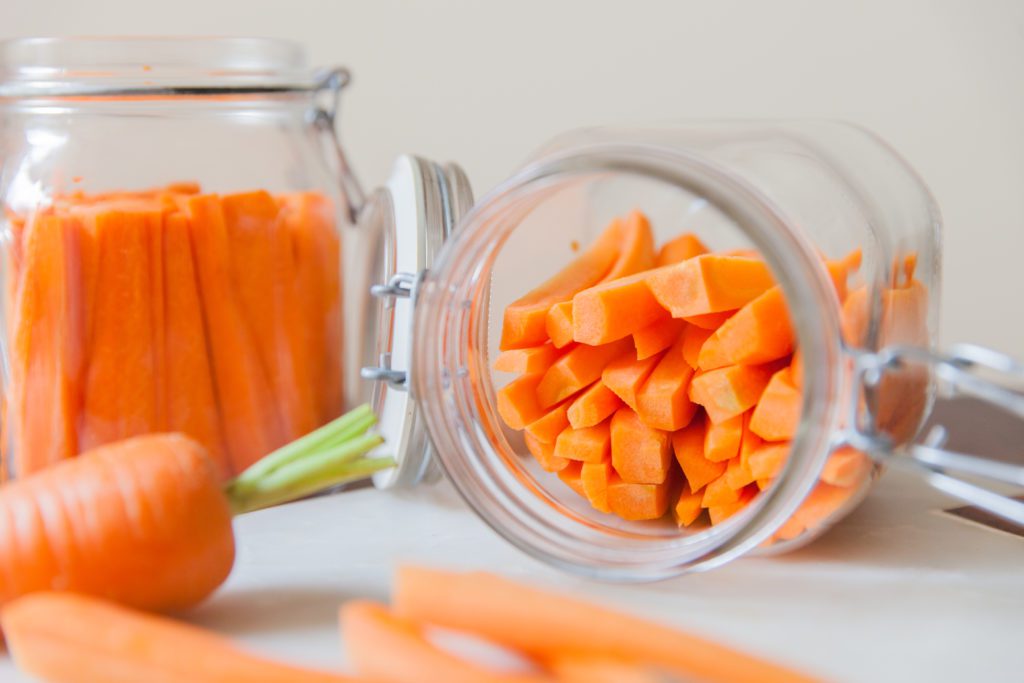
- 2 x 1 L flip top jar or larger (buy on Amazon)
- 12 Large carrots (approx 3kg organic if possible – you may have some left over depending on how big you cut your carrot sticks)
- 1 litre filtered water
- 23 grams good quality natural sea salt (I like using this Celtic sea salt or Pink Himalayan)
- Clean all equipment in hot tap water and a dash of white vinegar, avoid using the dish sponge which might hold food and oil residue, rinse well and air dry on a clean tea towel
- If you have access to good clean water you can use it straight from the tap, if you are unsure, boil the water and allow it to cool completely
- Dissolve the salt in the water to make the brine
- Wash and peel the carrots
- Measure the length of the carrot stick based on your jar, they should not be any longer than where the jar starts to curve as you need to cover the carrots in brine
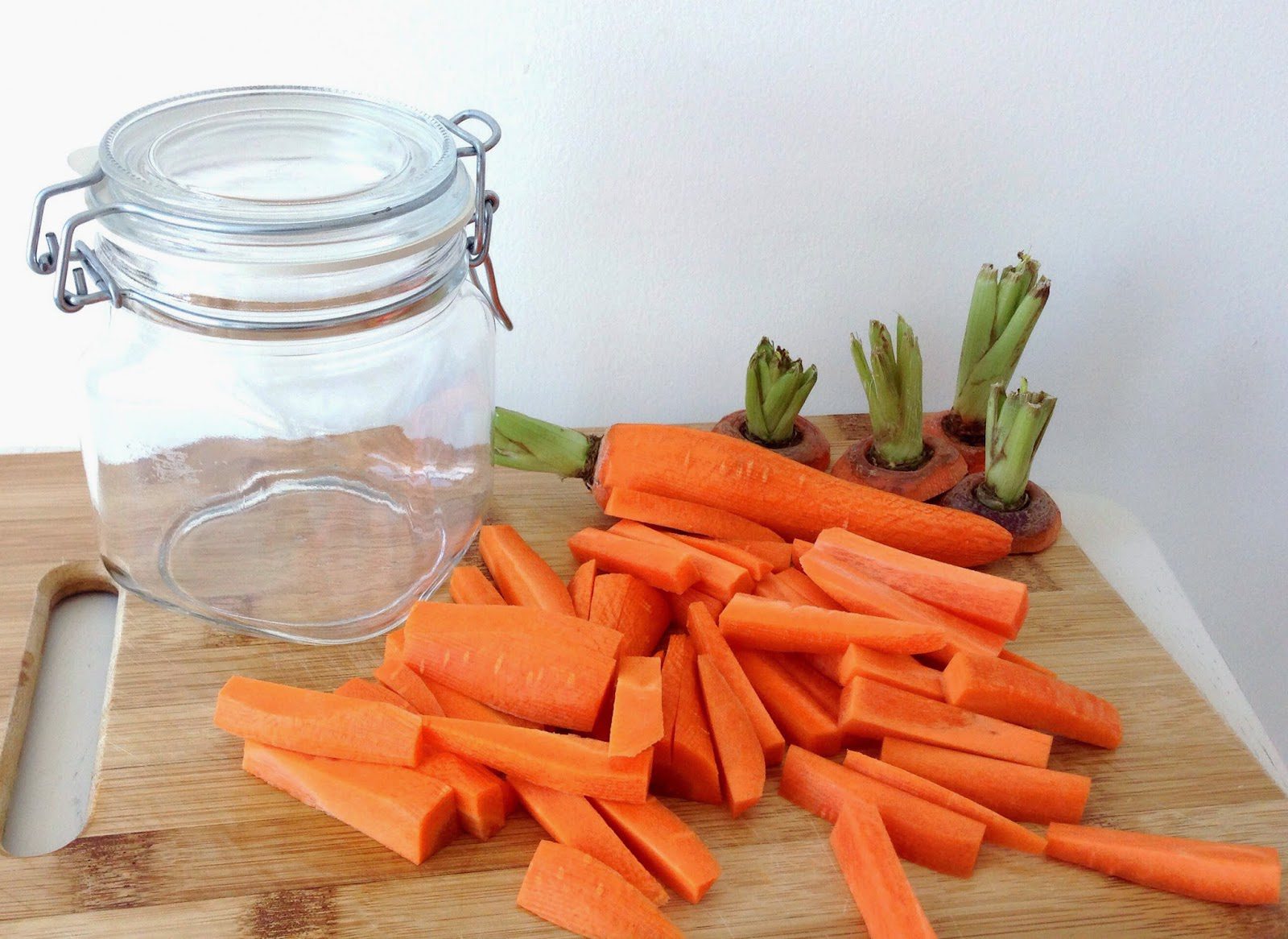
- Lay the jar on it’s side so you can stack the carrots easily without them falling over
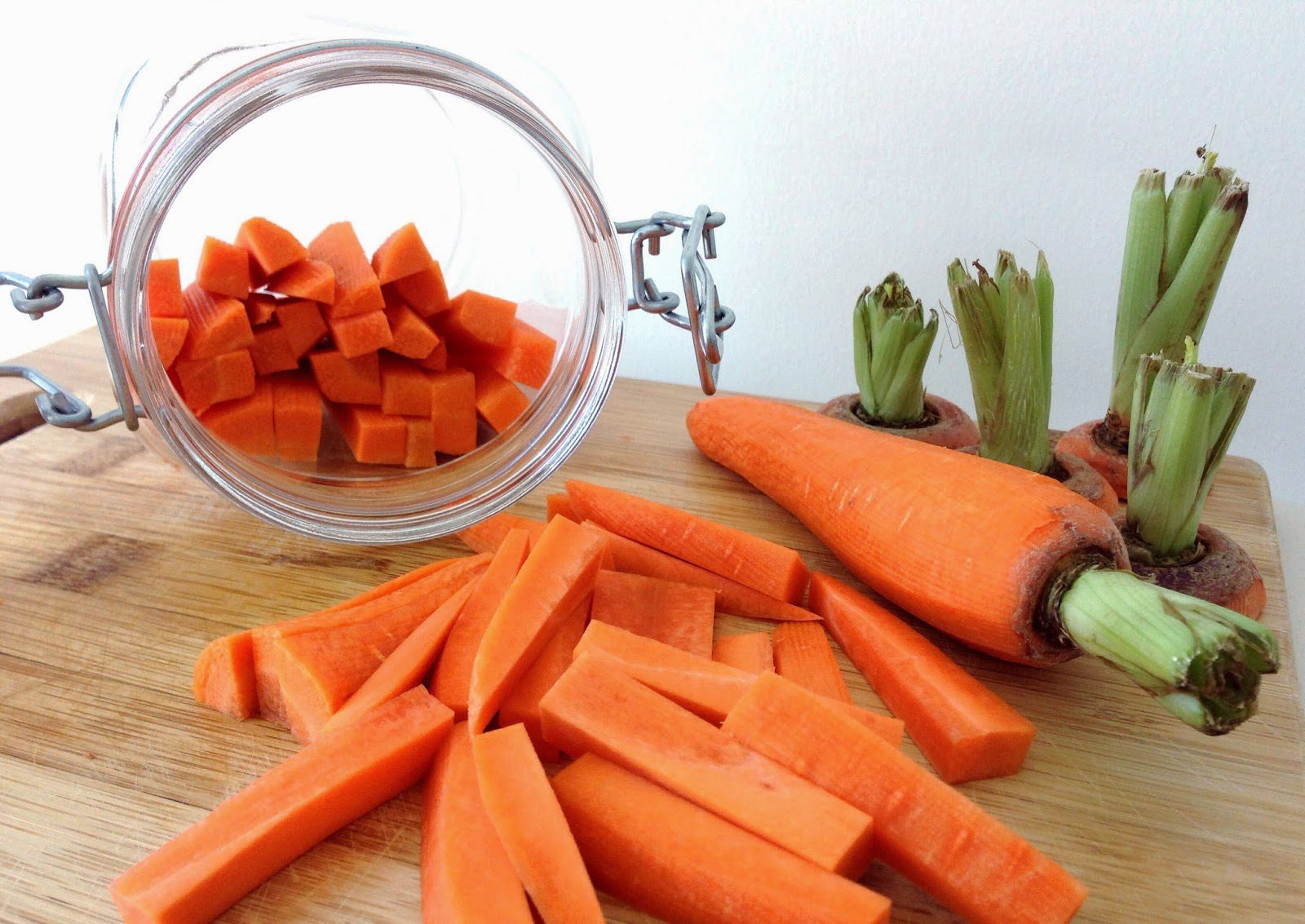
- Once the jar is full, turn the jar upright
- Insert as many more carrots as possible so that the carrots are packed very tightly to avoid them floating in the brine (they need to be fully submerged in the brine), I use my index finger to poke around for any gaps, this becomes part of the fun, to get in that one last carrot stick when you think you cannot add anymore!
- I find using the carrot sticks that are a little tapered easiest to insert in from the smallest end.
- When the salt brine is cooled completely, give it a final stir to ensure any undissolved salt is distributed evenly and cover the carrots
- Leave for 7-14 days to ferment, the cooler the weather the longer it may take to ferment
- You can leave the jar unopened on the counter for 6 months as they are now preserved
- For the probiotic benefits, consume within 45 days
- Once opened, store in the fridge and always use clean utensils (no fingers!)
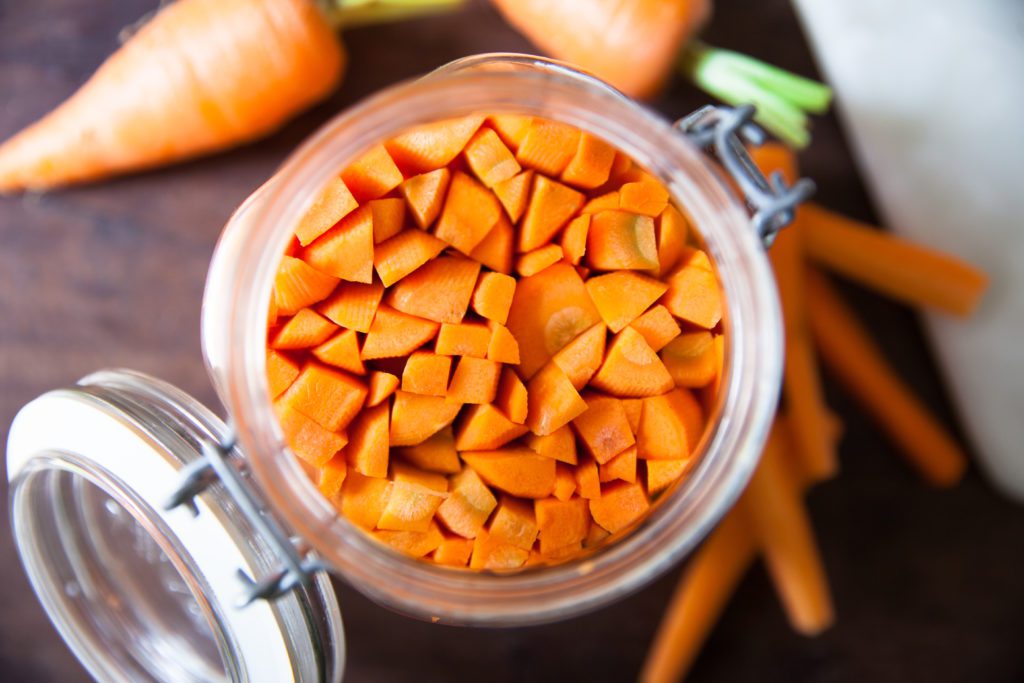
- Keep the jar out of direct sunlight, after 7 days you can open the jar to taste the carrots, they should be crunchy and sour
- Store them in the fridge once opened
- There is no need to move them to the fridge for storage if unopened as they are now preserved
- Eat the veggies at room temperature, do not heat them as the heat will destroy the beneficial bacteria
- The role of salt is key to a successful ferment, the salt inhibits the bad bacteria while allowing the good bacteria naturally present in the vegetables to start the fermentation process.
- Too little salt can produce mushy and slimy vegetables
- Too much salt inhibits the good bacteria as well as the bad bacteria, making a very sour and slow ferment
- Using a starter culture like Body Ecology’s Veggie Culture Starter is optional, the benefit is ensuring consistency with each batch as you know the exact strains you have put into the ferment rather than rely on what is naturally present in your vegetables, you can also use less salt (about 1 tea spoon of salt opposed to about 1 table spoon). This brand of starter also contains lactobacillus plantarum. This probiotic organism is known to reduce gut wall permeability and enable the body to produce it’s own folate amongst some other amazing things.
- I was referred to Body Ecology’s Veggie Culture Starter by my holistic doctor many years ago when i first started our healing journey as my son had a recurrent clostridium difficille (c.diff) infection and other gut related issues, within 2 weeks his symptoms improved and after 2 months of fermented foods we were able to clear the infection (if you live in Australia, get a 5% discount when you order from www.yourdigestion.com.au using discount code ‘loveurbelly’ at the checkout
- 2 x 1 L flip top jar or larger
- 12 Large carrots (approx 3kg organic if possible - you may have some left over depending on how big you cut your carrot sticks)
- 1 litre filtered water
- 23 grams good quality natural sea salt
- Clean all equipment in hot tap water and a dash of white vinegar, avoid using the dish sponge which might hold food and oil residue, rinse well and air dry on a clean tea towel
- If you have access to good clean water you can use it straight from the tap, if you are unsure, boil the water and allow it to cool completely
- Dissolve the salt in the water to make the brine
- Wash and peel the carrots
- Measure the length of the carrot stick based on your jar, they should not be any longer than where the jar starts to curve as you need to cover the carrots in brine
- Lay the jar on it's side so you can stack the carrots easily without them falling over
- Once the jar is full, turn the jar upright
- Insert as many more carrots as possible so that the carrots are packed very tightly to avoid them floating in the brine (they need to be fully submerged in the brine), I use my index finger to poke around for any gaps, this becomes part of the fun, to get in that one last carrot stick when you think you cannot add anymore!
- I find using the carrot sticks that are a little tapered easiest to insert in from the smallest end.
- When the salt brine is cooled completely, give it a final stir to ensure any undissolved salt is distributed evenly and cover the carrots
- Leave for 7-14 days to ferment, the cooler the weather the longer it may take to ferment
- You can leave the jar unopened on the counter for 6 months as they are now preserved
- For the probiotic benefits, consume within 45 days
- Once opened, store in the fridge and always use clean utensils (no fingers!)



